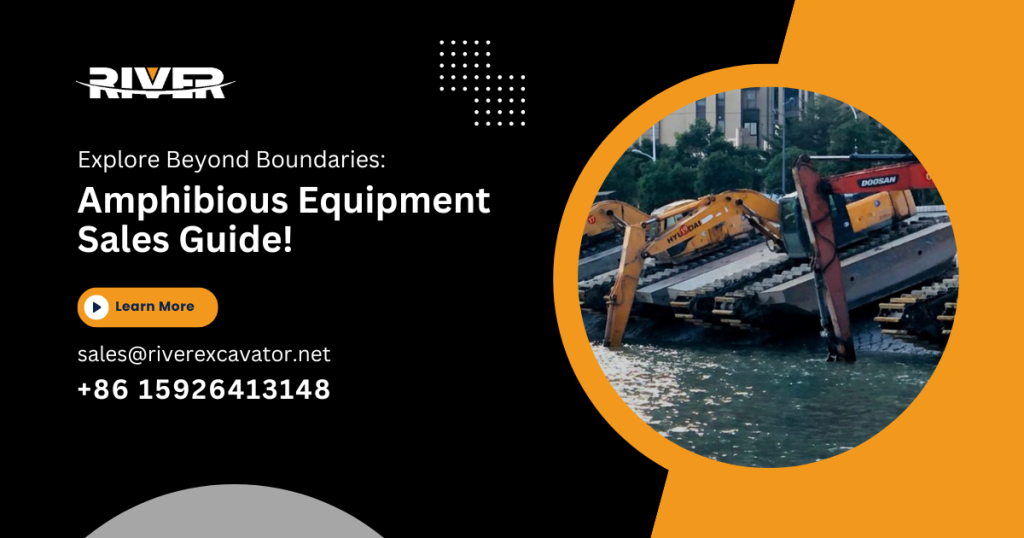
Unlocking New Possibilities with Amphibious Equipment for Sale
In the dynamic landscape of heavy industries and infrastructure development, amphibious equipment has emerged as a game-changer. These specialized machines are designed to operate seamlessly on both land and water, offering unparalleled versatility and efficiency in challenging environments. Whether for construction projects, environmental restoration, or disaster relief efforts, the demand for amphibious equipment continues to grow, driven by its unique capabilities and adaptability. This comprehensive sales guide explores the diverse range of amphibious equipment available, their applications across industries, and key considerations for potential buyers looking to invest in these innovative machines.
What is Amphibious Equipment?
Understanding the Basics
Amphibious equipment refers to specialized machinery designed to perform tasks on both land and water surfaces. These machines are equipped with features such as buoyant pontoons or tracks that enable them to traverse through marshlands, swamps, rivers, and other aquatic terrains without compromising performance. Amphibious excavators, marsh buggies, dredgers, and transporters are among the various types of equipment that fall under this category, each serving distinct purposes in different industries.
Types of Amphibious Equipment for Sale
Exploring the Variety
1. Amphibious Excavators
Amphibious excavators are equipped with extendable pontoons or tracks, allowing them to operate in wetlands, shallow water bodies, and soft terrains where conventional excavators would struggle. These machines are invaluable for dredging, land reclamation, and shoreline construction projects.
2. Marsh Buggies
Marsh buggies, also known as amphibious transporters, are specialized vehicles designed to transport heavy loads across marshy and swampy areas. They are essential for accessing remote or environmentally sensitive locations where traditional vehicles cannot operate.
3. Amphibious Dredgers
Amphibious dredgers are used for maintenance dredging, river and lake bed cleaning, and environmental remediation projects. They are equipped with powerful suction or excavation mechanisms to remove sediment and debris from water bodies efficiently.
4. Amphibious Transporters
Amphibious transporters are versatile vehicles capable of carrying heavy loads over water and rough terrain. They are commonly used in industries such as oil and gas exploration, mining, and military operations where access to remote or challenging environments is required.
Benefits of Using Amphibious Equipment
Advantages Across Industries
1. Enhanced Mobility and Accessibility
Amphibious equipment provides access to otherwise inaccessible or environmentally sensitive areas, making it ideal for infrastructure projects, wetland conservation, and disaster response efforts.
2. Cost Efficiency and Versatility
By eliminating the need for multiple types of equipment for land and water operations, amphibious machines reduce project costs and logistical complexities. They offer a cost-effective solution for organizations looking to maximize operational efficiency.
3. Environmental Sustainability
Amphibious equipment minimizes environmental impact by reducing ground pressure and disturbance to sensitive ecosystems during operations. This eco-friendly approach is crucial for projects in protected areas or habitats.
4. Increased Productivity and Performance
The versatility and adaptability of amphibious equipment enable faster project completion times and improved performance in challenging conditions. They enhance productivity by maintaining operational continuity across diverse terrains.
Considerations for Buying Amphibious Equipment
Key Factors to Evaluate
1. Operational Requirements
Assess your specific project needs, including the type of terrain, depth of water bodies, and required load capacities. Choose equipment that aligns with these requirements to maximize efficiency and effectiveness.
2. Quality and Reliability
Invest in reputable manufacturers like Jiangsu River Heavy Industry Co., Ltd, known for producing high-quality amphibious equipment with durable components and advanced technological features.
3. Maintenance and Support
Consider the availability of maintenance services, spare parts, and technical support from the manufacturer or authorized dealers. Regular maintenance is essential for prolonging the lifespan and performance of amphibious equipment.
How to Choose the Right Amphibious Equipment Supplier
Selecting a Trusted Partner
1. Reputation and Experience
Choose a supplier with a proven track record in the industry and extensive experience in manufacturing and distributing amphibious equipment.
2. Customer Support and After-Sales Service
Opt for a supplier that offers comprehensive customer support, including training, technical assistance, and responsive after-sales service to address any issues or concerns promptly.
3. Customization Options
Look for a supplier that offers customization options to tailor equipment specifications and features according to your specific project requirements and operational preferences.
The versatility and functionality of amphibious equipment make them indispensable assets across various industries. Whether for enhancing infrastructure development, supporting environmental conservation efforts, or facilitating disaster response initiatives, these machines offer unmatched capabilities that redefine operational possibilities. By understanding the diverse applications, benefits, and considerations associated with amphibious equipment, organizations can make informed decisions and leverage these innovative tools to explore beyond boundaries and achieve their project objectives effectively.

FAQs
1. What industries benefit most from using amphibious equipment?
Amphibious equipment is beneficial for industries such as construction, dredging, environmental remediation, oil and gas, mining, and disaster relief, among others.
2. How can amphibious equipment improve project efficiency?
By providing access to challenging terrains and reducing the need for multiple types of equipment, amphibious machines streamline operations and enhance project efficiency.
3. Are there environmental benefits to using amphibious equipment?
Yes, amphibious equipment minimizes environmental impact by reducing ground pressure and disturbance to sensitive ecosystems during operations.
4. Where can I purchase high-quality amphibious equipment?
High-quality amphibious equipment can be purchased from reputable manufacturers like Jiangsu River Heavy Industry Co., Ltd, or authorized dealers specializing in heavy equipment sales.
5. What factors should I consider when choosing amphibious equipment for my project?
Consider factors such as operational requirements, quality and reliability, maintenance and support, supplier reputation, and customization options when selecting amphibious equipment for your project.